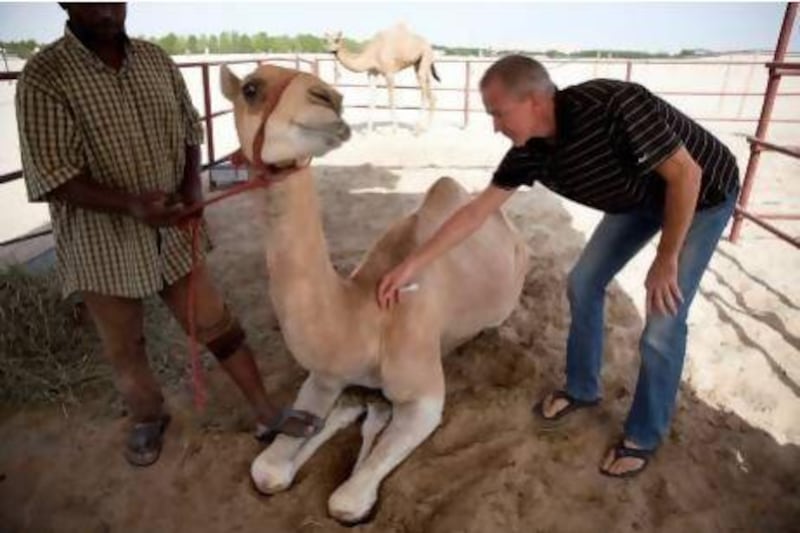ABU DHABI // The number of animals being tagged with identity microchips is increasing as part of an official registration programme.
The Dh40 million project, launched in 2010 by Abu Dhabi Food Control Authority, has expanded from livestock to include pets, such as cats, dogs, falcons, horses and even monkeys.
Officials say the programme helps control the spread of diseases because the microchips contain animals' history.
"The chip is an electronic machine that has information on the animal, such as species, age, name, breed and address," said Mohammed Al Hajj, a doctor and nutritionist at the Emirates Dog Breeders Society in Abu Dhabi.
"It is inserted under the animal's skin on the left side of its neck and it allows us to identify the animals to be able to differentiate them."
The society deals with seven breeds of dog, including labradors, German shepherds, Belgian malinois, rottweilers and huskies.
It has chipped 1,000 dogs in the city and 3,500 in the emirate so far. The society aims to reach 600 more in Al Ain and the Western Region and 2,000 emirate-wide by the end of the year.
"The microchip has a sticker with a barcode," Mr Al Hajj said. "It's like a passport for pets.
"Residents can buy the chip from a veterinary clinic for Dh50 to Dh75 and have it inserted in the animal for Dh150 to Dh200."
Dr Mohammad Reza, a veterinarian at Saqer Group in Al Wathba, microchips up to five camels a day.
"It's important because it identifies the animal," he said. "Other ID can be lost or changed but this is permanent and stays during analysis."
The chip, which details the animal's ownership, can be used to locate an animal at any given time.
"It helps if the animals get lost because the Government has the information recorded," he said. "The animal must be healthy to be able to receive this chip."
The Department of Municipal Affairs said in 2011 that the microchip would hamper the illegal trade in animals and prevent the spread of diseases. Although the chip has proven efficient for pets, experts believe they need the chips to contain more information about livestock.
"For camels, the microchips only have an 11-digit number and the emirate they originate from," said Pentti Koivisto, a veterinarian at Gulfcare in Abu Dhabi. "The problem is it doesn't include any information for them, it's just a number."
He said Abu Dhabi needed to make more efforts in terms of a livestock database.
"Every clinic in Abu Dhabi has their own database on animals but the owners don't even have their animal's number," he said. "In Dubai, the municipality has a database for the whole emirate because clinics must send their information to them."
Farmers would welcome such a move.
"It's a good idea to have a microchip with all the information because they will have their full data, in case they get lost or sick," said Abdullah Al Amimi, a farmer with 12 camels and 200 goats in Liwa.
"We trust our Government. If something is in our benefit, they will do it."
His sheep were tagged with numbers on their ears in 2011 but did not receive microchips.
In the meantime, he is implementing a "DNA card" for his camels.
"It's like a family trace for the camel itself," he said. "It's like a passport and it's quite efficient."






